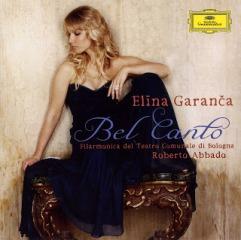Elina Garanca - Bel Canto (2009)
Elina Garanca - Bel Canto (2009)

01. Lucrezia Borgia Act 2 - Il segreto per esser felici 02. L'assedio di Calais Act 1 - Al mio core 03. Roberto Devereux Act 1 - All afflitto e dolce il pianto 04. Dom Sebastien Roi de Portugal Act 2 - Que faire Sol adore de la patrie 05. Adelson e Salvini Act 1 - Dopo l'oscuro nembo 06. Maria Stuarda Act 1 - Si vuol di Francia il Rege 07. Maria Stuarda Act 1 - Ah quando all ara scorgemi 08. Maria Stuarda Act 1 - In tal giorno di contento 09. Maria Stuarda Act 1 - Ah dal ciel discenda un raggio 10. Tancredi Act 1 - Andante 11. Tancredi Act 1 - O patria dolce e ingrata patria 12. Tancredi Act 1 - Di tanti palpiti 13. Maometto II Act 2 - Terzetto In questi estremi istanti 14. I Capuleti e i Montecchi Act 1 - Lieto del dolce incarco 15. I Capuleti e i Montecchi Act 1 - Ascolta se Romeo t uccise 16. I Capuleti e i Montecchi Act 1 - Riedi al campo 17. I Capuleti e i Montecchi Act 1 - La tremenda ultrice spada 18. L assedio di Calais Act 2 - Io l udia chiarmarmi a nome 19. L assedio di Calais Act 2 - Suon tremendo 20. L assedio di Calais Act 2 - La speme un dolce palpito Elina Garanca (mezzo-soprano), Ildebrando D’Arcangelo (bass) Matthew Polenzani (tenor), Ekaterina Siurina (soprano) Coro del Teatro Comunale di Bologna Filarmonica del Teatro Comunale di Bologna Abbado, Roberto (conductor)
The remarkably beautiful Latvian mezzo Elina Garanca possesses a voice of equal beauty: there’s not a note on this CD that lacks warmth, sheen, or fullness of tone. Over the range of about two octaves (from B to B to B) the sound is staggeringly even; her control over dynamics is stunning and her breath control is to be admired, while at the same time she never draws attention to it as a “stunt”. However, the first track on this CD, which admittedly is the worst example, is amazingly boring: Orsini’s “Brindisi” from Lucrezia Borgia, a piece that has been used as a showpiece aria for mezzos from Sigrud Onegin through Ernestine Schumann-Heink to Marilyn Horne, is sung here with no energy, no joie de vivre, no inflection whatsoever.
The notes with the track listing read “performed from the original manuscript” (the same is noted for an aria from Bellini’s Adelson e Salvini), and I presume this means not only textually accurate, but without any embellishments, which is how it (they) are performed here. While you assume bel canto arias will be embellished, I don’t necessarily find it required for enjoyment, but this is such dull singing that it sounds like a run-through. Throughout, Garanca never uses anything like chest voice, but that, too, isn’t necessary. What is necessary is an involvement in the text.
The Adelson aria, a sort-of first draft for Giulietta’s “Ah, quante volte” from I Capuleti…, is such a beautiful, languid piece, and it sits so ideally in the middle of Garanca’s voice, that you hardly notice how bland it is. If you recall Kiri Te Kanawa’s or Kathleen Battle’s early recordings, you’ll know what I mean–the most ravishing sounds coming from a musically intelligent, superbly trained singer with no interest in communicating anything other than the sound of her voice. Add to this the fact that Garanca’s Italian enunciation is mushy (an aria from Dom Sebastien in French ignites her somewhat), and well, you get an odd recital. She sings Elisabetta’s music from Maria Stuarda with the loveliness and grace of Maria, not the harridan Virgin Queen; and while “Di tanti palpiti” shows off her fluency with coloratura (there’s not much of it here), it certainly does not dazzle as it should.
It’s a pity, too, since much of the material here is unusual, and she’s assisted by terrific singers, particularly in the fine trio from Maometto II, which is a successful outing because all Garanca has to do is blend. Romeo’s opening aria from I Capuleti is also good, but as ever, it needs more energy. Like Battle and Te Kanawa, Garanca will not lean on her voice at any register. She’s saving for a rainy day, and I certainly hope I’m there to hear her: as I said, the sound itself is a veritable bath of loveliness. A bit of drama, please–this is opera, after all! (A complete recording of Capuleti is about to be released and will be reviewed here soon; let’s hope singing in context is what Garanca needs to whet her dramatic chops.) --- Robert Levine, classicstoday.com
download: uploaded anonfiles mega 4shared mixturecloud yandex mediafire ziddu








